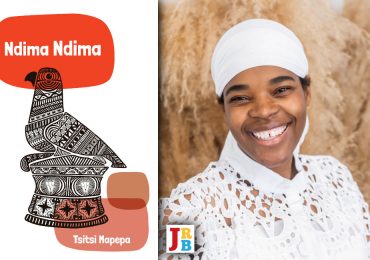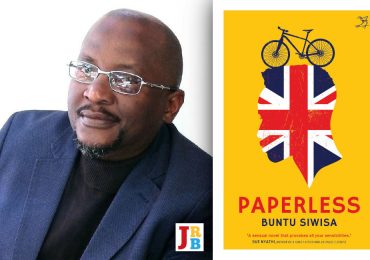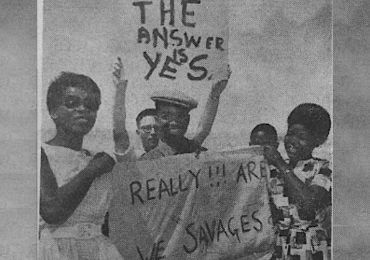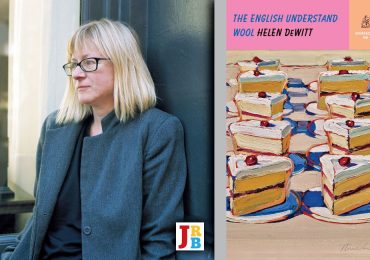It was a warm afternoon when I visited Weaver Press earlier this year. I was moderating a book launch for the publishers Irene Staunton and Murray McCartney, and had come to collect a copy of the book. I sat, as I have done many times over the years, in the small bookstore with its shelves of books and posters of historical publishing moments. Irene asked me if I could wait briefly as she had unexpected visitors, a couple of German Jesuit priests who had come by with a manuscript. The elder of the two had written a memoir of his life and missions, and had it typed out and bound to offer to Irene for her opinion. Pressed for time as she was, Irene sat down and began to peruse the pages of the work carefully, offering suggestions about typesetting and other technicalities. It was a perfect example of the passion she has for the world of words—more of which is expressed through our conversation about her history in Zimbabwean publishing.
Weaver Press is the independent publishing house Staunton and McCartney have run for twenty-five years. In that time they have produced a varied repertoire of local fiction and non-fiction, as well as republishing globally successful Zimbabwean authors—such as NoViolet Bulawayo—for local audiences.
Staunton’s history in publishing dates to early Zimbabwean independence, just after 1980. And this is where we begin our conversation.
Fungai Machirori for The JRB: Irene, how did you get involved in publishing?
Irene Staunton: When I was in the UK, I worked briefly—for about two or three years—with John Calder, an independent publisher. Calder’s was a house that published books in translation, including many of the French avant-garde writers such as Raymond Queneau, Nathalie Sarraute, Marguerite Duras, and, of course, Samuel Beckett. It was an interesting little firm in Soho. Between the interview and my joining the firm, John Calder decided my name was Susie! So, for my first two months that was what I was called. I rather liked it, you know. ‘Irene’, which means peace, is sort of quiet, subdued and introverted; but ‘Susie’ has a bit more cheek!
The JRB: Ah, so you had an alter ego?
Irene Staunton: Yes, an alter ego for a while, but it was not too long before I returned home to Zimbabwe after independence in 1980.
The JRB: There were obvious factions separating the liberal and the conservative white community at independence. What was your incentive for returning?
Irene Staunton: I’d always longed to come back to Zimbabwe. My parents, disenchanted with the Ian Smith government, had settled in the UK, but I always wanted to return home.
The JRB: And you worked as an editor for the Department of Culture in the post-independence Ministry of Education and Culture for a time.
Irene Staunton: When I first returned, I worked briefly with the Department of Culture, which then had luminaries such as Stephen Chifunyise and John Mapondera among them. At the time, there was much excitement around the idea of culture. John Mapondera had been to Australia and was very keen on having a culture house in every district. So, I think about forty senior cultural officers had been recruited. They were previously headmasters, and the idea was to hold a week-long workshop to introduce them to the concept of culture and what the ministry would be expecting of them. We even devised an MA programme in arts administration. Great concepts, but in the end only one culture house, in Murewa, was ever built, and I don’t know what happened to the teams of cultural officers.
The JRB: What did you do after that?
Irene Staunton: After that, I went to the curriculum development unit (CDU) where I worked for nearly four years as the editor. We were developing materials because the number of children going to school had multiplied exponentially, so schools were being built and teachers were still being recruited, and textbooks were needed fast. The CDU was set up to respond to this need. There were, I think, twenty-six subject teams with between one and six teacher–writers in each, who were developing texts for classes from Grades 1 to Form 4; and just one editor, me, as well as four typists with manual typewriters.
The JRB: That sounds like daunting work.
Irene Staunton: It’s very easy to look back critically. We were doing everything to multiply the number of copies produced, and to keep costs down, so we printed everything on newsprint and neither the illustrations nor the layout were very good. And, despite everyone working very hard, production was slow and intermittent. An alternative way of doing it would have been to give the newly developed syllabi to the commercial publishers for production purposes, because teachers and students wanted proper books.
The JRB: Now there is scant information online about Baobab Books, the publisher you worked at for many years between the late nineteen-eighties and nineties. Is it accurate to say you co-founded it?
Irene Staunton: Not quite. Hugh Lewin, the South African writer and activist, was working for a German agency teaching journalism and he was invited to start a publishing company. The secretary of the Media Monitoring Project of Zimbabwe, Tim Matthews, and the then-Information Minister, Nathan Shamuyarira, were looking to purchase Zimbabwe Publishing House (ZPH) from David Martin and Phyllis Johnson who owned it, and in 1987 were thinking of selling it. The idea was that Hugh would be waiting in the wings so that when ZPH was purchased, he would take over as the publisher. However, to cut a very long story short, it didn’t happen. In the meantime, I’d been recruited, and while Hugh and I were on hold, as it were, we began Baobab Books, a little publishing house in waiting, with a list of books that we thought would become a part of ZPH’s fiction list.
The JRB: What was your literary focus as Baobab Books?
Irene Staunton: We were looking to publish literary fiction. And we were extraordinarily lucky because we published Bones by Chenjerai Hove in 1988 as our first novel, and it won the Noma Award for Publishing in Africa. We then sold the rights to about eight different, generally small, independent publishers around the world who were interested in African writing. So, Hove had his first novel translated into Japanese, Dutch, German, French, Swedish and Norwegian, and it was, of course, available in the UK with Heineman and in South Africa. So, in a way, the success of Bones helped to put Baobab Books on the map.
The JRB: Was Baobab Books self-sustaining in those times?
Irene Staunton: In terms of selling enough copies to maintain a publishing house, this never happened. As I said when I was talking about the CDU, the demand for textbooks along with the huge expansion of the education system was enormous. Textbook publishing did very well in the first few years after independence and Textbook Sales, which had been doing it very successfully, took us over and we were partnered with the textbook publisher Academic Books. One might say that Baobab Books was a leech of sorts because it was the textbooks that we published under Academic that subsidised Baobab Books. Baobab could never have survived otherwise. People just didn’t buy enough fiction and non-fiction. I can vividly recall sometime in the mid-nineties worrying whether it was right to publish a novel which I thought was wonderful and offered a new perspective, or put up staff salaries. Because you couldn’t do both. These were very difficult decisions to make. By then the shareholders were also quite justifiably asking: ‘Where are the profits? Winning this or that prize matters very little if we don’t receive a return.’
The JRB: You eventually left Baobab Books to establish Weaver Press which you and Murray formed in 1998. Now, Weaver Press has a large list of varied publications; some seminal non-fiction works such as Mothers of the Revolution, which chronicles the narratives of women during the liberation struggle, and Becoming Zimbabwe, which offers a history of Zimbabwean nationhood. And there are also works on lobola, labour law, and so many other themes. Has that been an important role for you, to contribute to this archive that would otherwise not be as rich with these kinds of historical narratives?
Irene Staunton: I believe in the value of a diversity of voices. History offers us different analyses according to which facts are assembled and how they are interpreted. I also believe that the more widely and deeply we read to inform our opinions, we become more compassionate and less judgmental. Too often, we dismiss someone because of something they’ve done, but possibly this was just the culmination of a history of rejection, or exploitation, or marginalisation, or misunderstanding. Truth is complex and layered. I think it’s necessary to understand that there’s rarely, if ever, one single truth. A historian usually has a point of view that he or she wants to put across, having done their research and analysis. But then it’s important to have as many different histories as possible. Because they complement each other. We’re not publishing something because we think this is the ‘right’ history but because we consider these to be valuable perspectives. One hopes that the more we know, the better we understand, and the less we rely on opinion.
That said, every publisher develops their own identity, which is based on their standards and criteria as well as what they can afford to publish.
The JRB: And again, beyond the challenges of the times, the nineties really sound like they were a wonderfully fruitful time for the literary arts in Zimbabwe.
Irene Staunton: Yes, the nineties were a great time for publishing in Zimbabwe. There were six main publishers and quite a number of smaller publishers, all publishing new work. We had a wonderful annual book fair, the Zimbabwe International Book Fair. Everybody was involved: publishers, booksellers, librarians, printers, the non-fiction writers and writers’ associations, the Zimbabwe Book Development Council had a children’s tent, and so on. Publishers came from all over Africa, the Caribbean, America, Europe and Scandinavia. There were probably over a hundred stands every year. And the excitement was tremendous because it was an African fair in Zimbabwe, taking place in our own way in the Harare Gardens with subsidiary events such as the Indaba and workshops or performances. The former took place two days before the book fair and was held to debate and discuss issues around writing and publishing. You could launch books and have signing sessions, and there were parties every night. Publishers sold rights to their new titles, and we did it on our own terms. And we made friends from around the world. It really put Zimbabwe’s publishing scene on the map. It was a lot of hard work, but great fun and certainly worth all the effort that everyone put in.
The JRB: It sounds like a fabulous past that most of us born after independence unfortunately have no experience of. I’d like to go back to craft, to ask you what it is like when you’re an editor and you’re working in fiction across so many different forms, formats and writers? Are there genres that you are more amenable to, or that you find easier to edit than others? Or is it more the writing and the craft that sells you?
Irene Staunton: I have an old-fashioned view of publishing. You must believe in the book that you are going to publish. A weakness of mine is that I tend not to pay enough attention to the market, although, of course, it is not something that can be overlooked. Generally speaking, it’s always the backlist in publishing that supports the new titles; and if your backlist is not selling, then you have no front list. Nonetheless, one wants somehow to publish good writing: an author who explores a different angle, reveals a new dimension to the subject and the characters.
I believe, and have often said, that fiction is an important form of truth-telling; and I think one could argue that the fiction published in Zimbabwe since 1980 provides a layered and complex view of our history and our society.
On the other hand, one should not forget that writers have been expressing themselves for millennia, so, in terms of human experience, emotion and understanding much has already been expressed before. The question then is, how does this novel, poem or play provide fresh insights into a particular situation, new cadences to a style, and so on?
The JRB: Besides the obvious financial challenges, moving between fiction and non-fiction is not an approach I’d imagine many editors take.
Irene Staunton: I suppose it’s the serendipity of place, of living in Zimbabwe. There are differences, obviously, between working on a novel and on a non-fiction text. Larger publishing or specialist houses will have editors with a very specific remit: law, history, gender studies, children’s books, and so on. We are very small. Weaver Press is just myself and Murray, my husband. Work-wise we complement each other, having slightly different skills and interests. And we have both enjoyed working on a wide variety of texts—fiction, history, politics, gender studies, memoirs. Different genres offer different challenges, so one is never bored.
The JRB: In terms of the craft of writing, you had what must have been the very interesting experience of working with the late Charles Mungoshi.
Irene Staunton: Yes, Charles was—still is—one of Zimbabwe’s best writers. He was his own best critic, and he set the bar very high. He could sometimes spend hours selecting a single word for a particular situation or character. He would weigh it, think about its associations, write a sentence, cross it out, think some more and then write another sentence and cross it out until he really felt he had reached a certain truth, the heart of just that one sentence, sure in his own mind that it leant definition or nuance to a character or situation. You scarcely needed to edit his work. He was a superb editor of his own work. And he set his own very high standards. He also, and this should not be forgotten, read widely and deeply. Indeed, this is true of so many of Zimbabwe’s best writers.
The JRB: And what about writers who are not as meticulous as this. What has been your experience?
Irene Staunton: Well, this is a difficult question to answer. A writer who is not careful with words, who does not think very carefully about their meaning and associations, will not write a great book.
On the other hand, you can sometimes have a writer who has a wonderful story to tell, great plot ideas, a lovely sense of humour, a great ear for dialogue, but perhaps hasn’t had the experience or the education of writing. In such a case, however, if you put all the other ingredients together—a good eye, a good ear, imagination and empathy for the characters, an understanding of situations—an editor can help just by tidying up the language. This is impossible to do if the writer does not have these other integral skills.
The JRB: In your opinion, what does it take to be a good writer?
Irene Staunton: To be a very good writer takes a combination of so many skills. And hard work, of course, as well as a willingness to do research. Many first novels depend or draw almost entirely on the writer’s own experience, but after that, research is often needed to back up one’s imaginative skills.
A writer also needs a sharp ear and a fine eye in order to capture different idiolects and telling details. Often, inexperienced writers will describe someone with six or more adjectives, so the reader simply gets lost. What is needed is precision and exactitude so that a distinguishing feature will immediately allow the reader to see the character or situation in their own mind. Third, of course, a writer should have a very good sense of plot, of the way the drama will unfold. Perhaps, finally, beyond all else, a writer should have complete empathy with their characters. Some young writers feel themselves to be, as it were, on a pulpit, telling their readers who is good, or bad, and thus not allowing the characters to speak and act for themselves. A writer needs to remember that, essentially, they are simply the conduit through which their characters speak. In other words, one should be able to imagine oneself into perspectives and experiences that differ from one’s own.
The JRB: This has been so rich and so edifying, Irene. Thank you. In conclusion, I’d really like to ask you what has kept you in Zimbabwe? I am sure you have had many opportunities to leave, and you could easily have found a way to have a comfortable life elsewhere. What keeps you here?
Irene Staunton: I would never leave. I think Zimbabweans are amazing as a people when you consider what this nation has been through over the last century. Only very recently, the value of the currency people had, if they had any savings at all, was halved. And I sat down with a group of friends on Sunday, and everyone made jokes and laughed. As the poet Chirikure once said, ‘If we didn’t laugh, we’d cry.’ Laughter, as I think all Zimbabweans appreciate, is a way of diminishing the problem, rejecting it, rather than letting it control you. We all understand the challenges of struggling to make ends meet on a street corner, but people in Zimbabwe are not victims. They’re resilient, and so often they pick themselves up against all odds and make a plan. We have a Dutch friend, a consultant, and who has worked all over the world and in many warzones. He often told Murray and I that we were too complacent, asking us why we didn’t go somewhere else or do something else, asking us why we didn’t challenge ourselves. But I don’t think he was right. Living here with the everyday challenges of being a white person, having a tiny little publishing company, trying to produce good work in a country that’s been consistently traumatised by one or another problem, is a challenge enough.
- Fungai Machirori is a Zimbabwean writer, researcher and commentator interested in African literary and digital spaces. You can learn more about her work at her website.






13 thoughts on “The heady days of post-independence literature in Zimbabwe—Fungai Machirori interviews renowned independent publisher Irene Staunton”